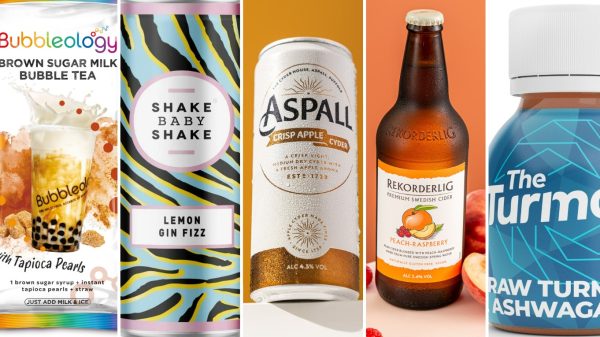
Mars chief climate officer and global VP of sustainability Kevin Rabinovitch
Net zero carbon and ambitious sustainability goals have found themselves under increasing scrutiny over the past year, as businesses grapple with the importance of addressing their environmental impact.
A backlash has begun, with brands being widely accused of greenwashing, overstating their sustainability intentions or making little real impact on their emissions, while the industry continues to demand effective, transparent plans for the future.
In the face of the increasing impacts of climate change, multinational food brand Mars has been speaking out on the importance of delivering solid, measurable results rather than just talking about targets.
“Measurable ESG goals are important for businesses, but disclosure on progress is even more of an imperative,” says Mars chief climate officer and global VP of sustainability Kevin Rabinovitch.
“Measuring progress – the action taken – is the only way to hold the business accountable and to demonstrate the progress and results needed to start bending the curve down toward 1.5°C.”
The importance of progress
Rabinovitch leads Mars’ corporate strategy for the Healthy Planet part of its ‘Sustainable in a Generation’ plan. This means he assesses the environmental impact of the company’s entire value chain while also managing its global portfolio of renewable energy projects.
“Now more than ever, it’s critical we deliver meaningful progress against our net zero commitment to tackle the climate emergency and safeguard the resilience of the planet, global communities, and our businesses,” he says.
Subscribe to Grocery Gazette for free
Sign up here to get the latest grocery and food news each morning
As a multinational buyer sitting at the very end of a long and complex supply chain, it’s imperative that Mars’ Sustainability Plan has a clear and transparent purpose.
And it does. The plan centres around changing the way the whole business works – from how it sources raw materials and ensures ethical supply chains to building lasting partnerships with NGOs, governments and industry.
Stating clearly that “the world we want tomorrow starts with how we do business today”, Mars is focusing on the importance of separating business growth from emissions – and on actively driving those emissions down.
COP27; food, farming and the supply chain
In November last year, world leaders, businesses and climate activists came together for COP27. It was the first time that the annual climate summit had hosted a Food Systems Pavilion, which put food, farming and the supply chain at the centre of the conversation.
Rabinovitch was on the ground at the summit, which he described as an “energising and invaluable opportunity”, where the Pavilion focused specifically on identifying ‘actions, strategies and solutions’ across the entire food value chain.
The conversations taking place at the summit were largely similar to the priorities already outlined in Mars’ Sustainable in a Generation plan, highlighting the critical role that food systems can play in finding climate solutions.
These included net zero commitments, deforestation, transforming the supply chain, scaling climate smart and regenerative agriculture and the impact of climate change on farmers, and the UN Sustainable Development Goals (SDGs).
However, while Rabinovitch saw a number of “positive announcements” coming out of COP27, he says that “unfortunately, the reality is that promises and pledges made in Glasgow at COP26 still haven’t been met – and even those didn’t put us on a path to 1.5°C world”.
“There’s a lot of work still to do, and these aren’t easy challenges. But, through collaboration, partnerships and the energy seen at COP27, I’m optimistic that we can innovate new and improved solutions to transition from a ‘race to commitments’ into a more impactful ‘race to results’.”
The Mars’ approach to net zero
As a privately-owned company, Mars is able to stand back and take a longer-term view; thinking in terms of generations rather than quarters. It also has the freedom to spend billions of dollars on its plan, accelerating intervention and delivering real change.
“We’re taking tangible actions to redesign our supply chains to stop deforestation, scale up initiatives in climate smart and regenerative agriculture, transition to 100% renewable energy and challenge our suppliers to take climate action,” says Rabinovitch.
Mars has a strong emissions reduction plan in place, with targets in line with the Paris Agreement and greenhouse gas targets for 2025 and 2050 fully approved by the Science-Based Target Initiative (SBTI).
It is also developing a roadmap in line with SBTI rules on net zero commitments.
The business has already cut 29% of direct emissions from its direct operations (compared to a 2015 baseline) and is on track to beat its 2025 target of reducing emissions by 42%.
Looking beyond this, Mars has also reduced emissions across its entire value chain by 6.1% and remains committed to reducing emissions across its entire GHG footprint, including all scope 3 (indirect) emissions.
The scientific community recognises that the wider food industry is one of the hardest sectors to completely decarbonise, making a focus on reducing scope 3 emissions crucial for global, corporate businesses like Mars.
“We are continuing to push the boundaries of what is possible through climate-smart, regenerative agriculture,” Rabinovitch says.
“This requires an acceleration of our existing work, along with more integrated partnerships with our suppliers and support for farmers – but we’re well on our way.”
How Mars is transforming its supply chain
By most estimates, the agricultural food system accounts for approximately one-quarter of all greenhouse gas (GHG) emissions worldwide – rising to more than 40% in the UK.
With the majority of scope 3 emissions coming from its agricultural supply chains, Mars is taking specific action to tackle deforestation, address land use and transform how it sources raw materials.
“We are focusing our actions on the areas of our business that involve producing and purchasing these agricultural raw materials,” Rabinovitch explains.
Mars is doing this by driving transformative change across five raw materials it has identified as having the greatest risk: cocoa, beef, palm oil, pulp and paper and soy. For example, it is working to deliver deforestation-free supply chains for cocoa by 2025, focusing on protecting children, preserving forests and protecting farmer incomes.
“Our long-term vision is to expand our influence with suppliers beyond just the materials we purchase so that our suppliers prevent deforestation and land conversion throughout their full business – for all of their customers, not just Mars,” says Rabinovitch.
Mars has also set an aggressive strategy to design all of its products for a circular economy, investing hundreds of millions of dollars to redesign more than 12,000 packaging components. This project includes eliminating unnecessary packaging, removing difficult to recycle materials such as PVC and using recycled content wherever possible.
“There is always more work to be done, but we’re heading in the right direction,” Rabinovitch concludes.
“Measurable ESG goals are important for businesses, but disclosure on progress is even more of an imperative. Measuring progress – the action taken – is the only way to hold the business accountable and to demonstrate the progress and results need to start bending the curve down toward 1.5°C.
“We’ve seen the race to commitments across businesses and sectors, but now, we really need to see a race to results. Following conversations at COP27, I’m hopeful that this will come into effect. It’s only with measurable goals and data that we will be able to do this and show the impact.
“We are always asking ourselves what impact the decisions we take today will have on our future.”










